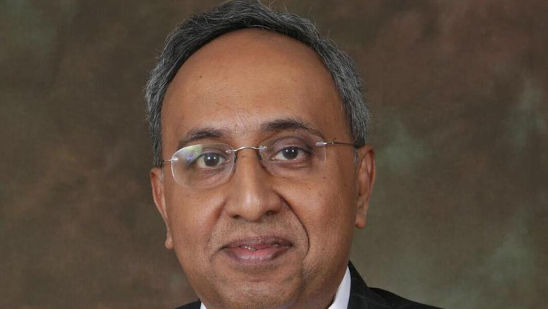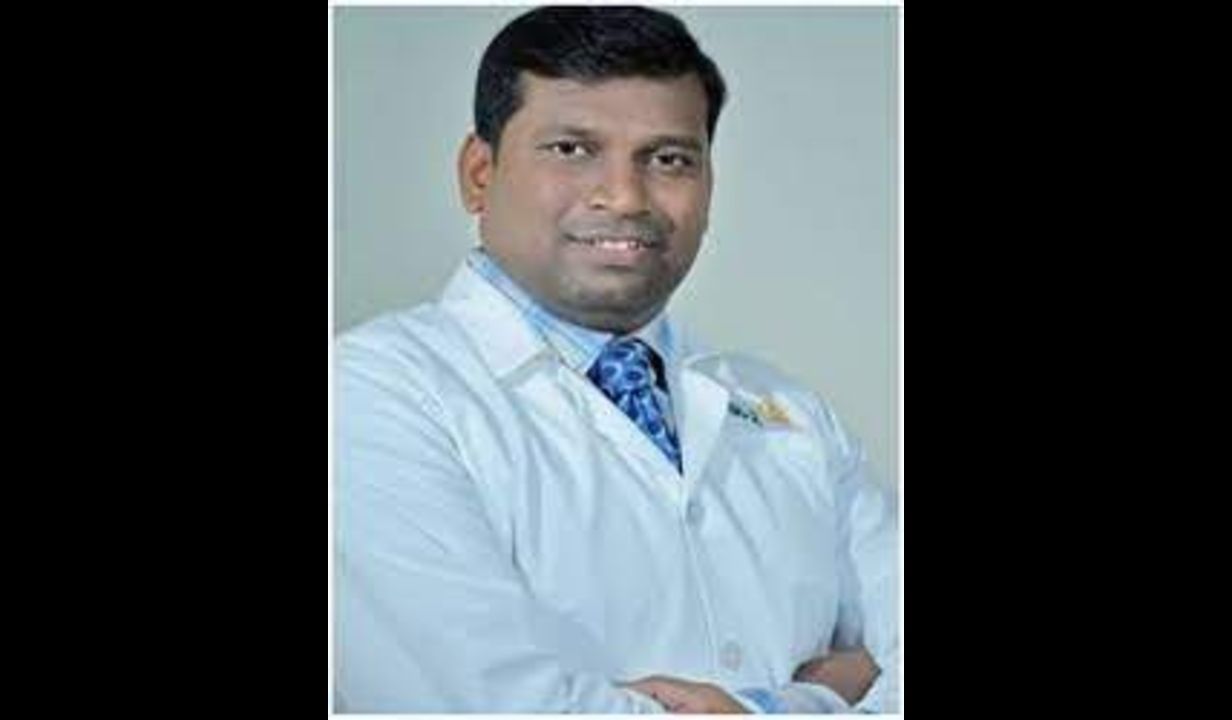Welcome User
Relevance
Consult Endocrine Surgeons Online (8 doctors)

Dr Venkata Naga Sai Tribhushan Rambhatla
General Physician
3 Years • MBBS
Bengaluru
PRESTIGE SHANTHINIKETAN - SOCIETY CLINIC, Bengaluru

Dr. Sushith C
General Physician
2 Years • MBBS
Bengaluru
PRESTIGE SHANTHINIKETAN - SOCIETY CLINIC, Bengaluru
Dr Sumanth R
General Physician
2 Years • MBBS
Bengaluru
PRESTIGE SHANTHINIKETAN - SOCIETY CLINIC, Bengaluru

Dr. B Sujeeth Kumar
Surgical Gastroenterologist
16 Years • MBBS, MS(General Surgery), FIAGES(Minimal Access Surgery), FAIS, FALS (Advanced Laparoscopic Colorectal Surgery), DIPMAS(Minimal Access Hernia Surgery), FICRS (Robotic Surgery)
Manikonda Jagir
Apollo Clinic, Manikonda, Manikonda Jagir

Dr. Sai Krishna Vittal
Endocrine Surgeon
22 Years • MBBS, MS, DNB, FRCS(Ed),FRCS(Eng), FICS, FAES, FCSSL(Hon)
Chennai
Apollo Hospitals Greams Road, Chennai
(25+ Patients)

Dr. Sai Vishnupriya Vittal
Endocrine Surgeon
20 Years • MBBS, DNB (Gen Surg), MRCS (Ed), FRCS, (Glasg), MCh (Endo Surg), FICS, FAIS, FAES
Chennai
Apollo Hospitals Greams Road, Chennai
(25+ Patients)

Dr. Ferdinant J
Endocrine Surgeon
12 Years • MBBS, MS, DNB,Gen. Surg.,MNAMS,MC.h
Angamaly
Apollo Hospitals Karukutty, Angamaly

Dr. Muthukumar S
Endocrine Surgeon
16 Years • Mch
Madurai
Apollo Speciality Hospitals KK Nagar, Madurai
Book Consult for Endocrine Surgery Online
Booking an appointment with a skilled endocrine surgeon is now easier than ever with Apollo 24|7. Our user-friendly platform allows you to schedule online or in-person consultations with top endocrine surgeons at your convenience. With a wide network of trusted hospitals and clinics, we ensure that you have access to the best medical expertise for your endocrine-related concerns. Our experienced endocrine surgeons are committed to providing personalised care and guiding you through every step of your treatment journey. Don't wait any longer; book your appointment with an endocrine surgeon at Apollo 24|7 today and take the first step towards better health.
What is Endocrine Surgery?
Endocrine surgery is a specialised branch of surgery that focuses on treating disorders of the endocrine glands, which are crucial for releasing hormones directly into the bloodstream. This speciality addresses a range of conditions, primarily those involving the thyroid, parathyroid, adrenal glands, and some elements of the pancreas and gastrointestinal tract.
The relevance of endocrine surgery in healthcare is significant due to its role in managing and potentially curing conditions that can have widespread effects on metabolism, reproductive health, and overall bodily functions.
Who is an Endocrine Surgeon?
An endocrine surgeon is a highly trained specialist who performs surgeries on the hormone-producing glands of the body. These surgeons are skilled in procedures that range from minimally invasive to complex surgeries, depending on the condition and the gland involved.
The qualifications of an endocrine surgeon typically include advanced training in surgical procedures affecting the thyroid, parathyroid, and adrenal glands, among others.
They play a crucial role in managing diseases like thyroid cancer, hyperthyroidism, and other hormone-related disorders. Their expertise ensures that surgical interventions are timely and effective, aiming for the best possible outcomes for patient health.
What Does an Endocrine Surgeon Do?
These surgeons play a critical role in managing diseases that can significantly impact a patient's metabolism and overall health.
Key Responsibilities:
Surgical Interventions: They perform various surgeries such as thyroidectomies, parathyroidectomies, and adrenalectomies. These procedures require precision to avoid affecting nearby organs and nerves.
Diagnosis and Preoperative Assessment: Endocrine surgeons are involved in diagnosing glandular diseases through physical exams and interpreting diagnostic tests like blood worand imaging studies. They plan the surgical approach based on individual patient needs.
Postoperative Care and Monitoring: After surgery, they monitor patients' recovery and the efficacy of the surgery, adjusting postoperative care plans as necessary. This often includes collaboration with endocrinologists to manage hormone levels and ensure optimal recovery.
Patient Education: They provide detailed explanations to patients about their conditions, the surgical procedures, and the expected outcomes. Educating patients is crucial for postoperative care, particularly about lifestyle adjustments and medication management.
Research and Continuous Learning: Many endocrine surgeons engage in research to advance their field and improve surgical techniques and outcomes. They also stay updated with the latest developments through continuous professional development.
Daily Activities:
Conducting consultations to evaluate new and follow-up patients.
Performing scheduled surgical procedures, often using minimally invasive techniques to reduce recovery time and complications.
Collaborating with a multidisciplinary team, including endocrinologists, oncologists, radiologists, and nurses, to provide comprehensive care.
Reviewing and interpreting diagnostic tests to monitor patients’ conditions and progress.
Participating in hospital rounds to assess postoperative patients and planning necessary interventions.
Through these activities, endocrine surgeons provide critical care that significantly enhances patients' quality of life by effectively managing complex endocrine disorders.
What are the Other Sub-specialities of Endocrine Surgery?
Endocrine surgery encompasses a range of specialised procedures targeting the body's hormone-producing glands. Here’s an overview of the sub-specialities within this field:
Thyroid Surgery: Focuses on disorders of the thyroid gland, including hyperthyroidism and thyroid nodules. Surgeons, including thyroid cancer surgeons, perform partial or complete thyroidectomies depending on the severity of the condition.
Parathyroid Surgery: Involves the surgical treatment of parathyroid disorders, often to address calcium imbalances caused by tumours or hyperplasia. This sub-speciality often requires the expertise of a parathyroid specialist.
Adrenal Gland Surgery: Targets the adrenal glands to treat conditions like adrenal tumours and hyperaldosteronism. This surgery is performed by an adrenal specialist and might involve removing one or both adrenal glands.
Minimally Invasive Endocrine Surgery: Utilises techniques that reduce recovery times and minimise surgical risks. It includes laparoscopic and robotic surgeries to remove endocrine glands with less impact on the body.
Pancreatic Neuroendocrine Tumour Surgery: Focuses on removing tumours from the pancreas that affect hormone production. These surgeries are delicate and require precise surgical intervention.
Endocrine Tumour Removal: Involves the surgical extraction of benign or malignant tumours from various endocrine glands.
Hyperparathyroidism Surgery: Specifically addresses the excessive production of parathyroid hormone, which can lead to significant health issues like osteoporosis and kidney stones.
Thyroid Cancer Management: Combines surgical removal of thyroid tissue with subsequent treatments like radioactive iodine to manage thyroid cancer comprehensively.
Robotic Endocrine Surgery: Employs robotic systems to enhance precision in surgeries, particularly for hard-to-access or very small glands.
Reoperative Endocrine Surgery: Performed when initial surgeries need revisions or when complications from previous surgeries arise.
Pediatric Endocrine Surgery: Tailored to meet the specific needs of children with endocrine disorders, requiring specialised care and consideration of future growth.
Paraganglioma and Pheochromocytoma Surgery: These surgeries involve the removal of rare tumours that can produce excess adrenaline, often leading to severe cardiovascular issues.
Surgical Management of Cushing’s Syndrome: Targets the removal of tumours that lead to the overproduction of cortisol, requiring careful coordination with an endocrine specialist.
Hormone-Secreting Tumour Excision: Focuses on removing tumours that affect hormonal balance, crucial for maintaining homeostasis.
Surgery for Multiple Endocrine Neoplasia (MEN): Involves managing genetic disorders that cause multiple tumours in endocrine glands, often requiring multiple surgeries over a patient’s lifetime.
These sub-specialities demonstrate the breadth of endocrine surgery, showcasing how surgeons, including a doctor for adrenal tumours, address complex glandular disorders to improve patient health. Each area requires distinct skills and knowledge to manage the delicate balance of hormones essential for body functions.
What are the Endocrine Surgery Examinations or Tests Performed by the Endocrine Surgeon?
Endocrine surgeons utilise a variety of diagnostic tests and examinations to accurately assess and diagnose conditions related to the endocrine glands. These tests are crucial for determining the appropriate surgical or medical treatment for gland-related disorders.
Blood Tests: These are the most common initial tests to check for abnormal levels of hormones and other substances in the blood, indicating issues with endocrine glands. Tests may measure hormone levels related to the thyroid, parathyroid, and adrenal glands, among others.
Ultrasound: A non-invasive imaging technique used primarily to examine the thyroid and parathyroid glands. It helps in identifying nodules, tumours, and other abnormalities in gland structure.
CT Scan (Computed Tomography): Provides detailed images of the body's internal structures, helping to locate and identify tumours in the adrenal glands or other endocrine-related structures.
MRI (Magnetic Resonance Imaging): Used for getting high-resolution images of the endocrine organs, particularly when detailed soft tissue contrast is needed, such as in the pituitary gland.
Fine-Needle Aspiration Biopsy: Often used in conjunction with ultrasound, this minimally invasive procedure involves extracting tissue samples from a gland, primarily the thyroid, to test for cancer cells.
Radioactive Iodine Uptake Test: Specifically evaluates thyroid function by measuring how much radioactive iodine is absorbed by the thyroid gland from the blood, useful in diagnosing hyperthyroidism or thyroid cancer.
Sestamibi Scan: A special imaging test that uses radioactive material to locate overactive parathyroid glands, a common issue in hyperparathyroidism.
These examinations are integral to the practice of an endocrine surgeon, ensuring that each patient receives a tailored treatment plan based on precise diagnostic results.
If you need to schedule a consultation or require these specific tests, it’s advisable to book endocrine surgeon who is well-versed in the latest diagnostic technologies.
What are the Common Conditions & Diseases that Endocrine Surgeons Treat?
Endocrine surgeons address a variety of conditions and diseases affecting the hormone-secreting glands of the body. These are some of the most common issues they manage:
Thyroid Nodules: Small lumps in the thyroid gland that can be benign or malignant.
Hyperthyroidism: Excessive thyroid hormone production, often due to Graves' disease or overactive thyroid nodules.
Thyroid Cancer: Malignant tumours of the thyroid gland, requiring surgical removal and possibly other treatments.
Hypothyroidism: Insufficient production of thyroid hormones, sometimes following surgery or from autoimmune disease.
Parathyroid Adenoma: Benign tumours of the parathyroid gland that cause overproduction of parathyroid hormone.
Hyperparathyroidism: Excess production of parathyroid hormone, leading to elevated calcium levels, which can cause various symptoms including bone loss and kidney stones.
Adrenal Tumours: Tumours on the adrenal glands that can affect hormone levels and require surgical removal.
Cushing’s Syndrome: A condition caused by high cortisol levels, often due to a tumour on the pituitary or adrenal glands.
Pheochromocytoma: A rare tumour of the adrenal gland that secretes excess adrenaline, leading to severe hypertension.
Goitre: Enlargement of the thyroid gland, which can cause breathing and swallowing difficulties.
Thyroiditis: Inflammation of the thyroid, which can cause temporary hyperthyroidism or hypothyroidism.
Multiple Endocrine Neoplasia (MEN): A group of disorders that affect multiple endocrine glands, leading to the development of hormonal imbalances and tumours.
Insulinoma: A rare pancreatic tumour that causes excessive insulin production and low blood sugar.
Pancreatic Neuroendocrine Tumours: Tumours arising from the hormone-producing cells of the pancreas.
Paraganglioma: Similar to pheochromocytoma, these are rare tumours that can develop anywhere in the body and may produce adrenaline.
These conditions can significantly impact a patient's quality of life, necessitating specialised surgical care to manage or cure the underlying hormonal imbalances.
Reasons to See an Endocrine Surgeon
Patients often consult an endocrine surgeon when experiencing symptoms that suggest a dysfunction in their endocrine system. Here are some key reasons:
Persistent symptoms related to hormonal imbalances, such as fatigue, weight changes, excessive sweating, or irregular heartbeats.
Detection of lumps or abnormalities in endocrine glands via physical exams or imaging.
Diagnosis of an endocrine condition that may require surgical intervention, such as a suspicious thyroid nodule or an overactive parathyroid gland.
Management of complex endocrine disorders, where medicinal treatments have not been effective.
If experiencing any related symptoms, consider scheduling an online endocrine surgeon consultation to discuss potential diagnoses and treatment options.
What Types of Procedures do Endocrine Surgeons Perform?
Endocrine surgeons are specialised in a range of procedures designed to address disorders of the endocrine system. These can be broadly categorised into top therapies and top surgeries within the speciality.
Top Therapies in Endocrine Surgery:
Radioactive Iodine Therapy: Used primarily for treating hyperthyroidism and certain types of thyroid cancer. It involves oral administration of radioactive iodine to destroy overactive thyroid cells.
Hormone Replacement Therapy: Administered post-surgery, especially after total thyroidectomy or hypophysectomy, to maintain normal hormone levels in the body.
Alcohol Ablation Therapy: Involves injecting alcohol into benign cystic thyroid nodules to reduce their size without more invasive surgery.
Top Surgeries in Endocrine Surgery:
Thyroidectomy: Surgical removal of all or part of the thyroid gland, typically for conditions like thyroid cancer, goitre, or hyperthyroidism.
Parathyroidectomy: Removal of one or more parathyroid glands to treat hyperparathyroidism.
Adrenalectomy: Removal of one or both adrenal glands, often due to tumours or overproduction of adrenal hormones.
Pancreatic Surgery for Neuroendocrine Tumours: These surgeries remove tumours from the pancreas that affect hormone production.
Transsphenoidal Surgery: A minimally invasive surgery to remove tumours from the pituitary gland through the nasal cavity.
Thyroid Lobectomy: Removal of half of the thyroid gland, often used when nodules, inflammation, or cancer affects only one side of the thyroid.
Minimally Invasive Robotic Surgery: Utilises robotic systems to perform surgeries with precision, particularly for delicate or hard-to-access glands.
Pheochromocytoma Removal: Surgical treatment for benign but potentially dangerous tumours of the adrenal gland that produce excess adrenaline.
Paraganglioma Surgery: Removal of rare tumours that can occur anywhere in the body and may produce hormones.
Reoperative Parathyroid Surgery: Performed when previous surgeries to correct parathyroid disorders were unsuccessful or incomplete.
Lymph Node Dissection: Often performed during surgeries for thyroid and parathyroid cancers to check for the spread of cancer.
Bilateral Neck Exploration: A comprehensive approach to locating and assessing multiple parathyroid glands during a single operation.
Thyroid Cancer Debulking: Involves removing as much thyroid cancer tissue as possible, used when complete removal isn't feasible.
Subtotal Thyroidectomy: Removal of a significant portion, but not all, of the thyroid gland, usually to treat a severely enlarged thyroid (goitre).
Cervical Thymectomy: Removal of the thymus gland, sometimes performed to access and treat diseases of the thyroid and parathyroid glands.
These procedures vary widely in complexity and risk, and the choice of procedure depends heavily on the specific endocrine disorder being treated.
Patients considering these surgeries should discuss the potential benefits and risks, including the endocrine surgeon fee, to make informed decisions about their healthcare.
Why Choose an Apollo 24|7 Endocrine Surgeon?
Apollo 24|7 endocrine surgeons are highly skilled and experienced in diagnosing and treating a wide range of endocrine disorders. They offer personalised care tailored to each patient's specific needs and have access to advanced treatment options and state-of-the-art surgical techniques.
Patients can benefit from seamless access to consultations, both online and in-clinic, ensuring comprehensive and convenient healthcare services. With their expertise and dedication to patient care, Apollo 24|7 endocrine surgeons provide the highest quality of care for optimal treatment outcomes.
What to Expect When Visiting an Endocrine Surgeon?
When visiting an endocrine surgeon, patients can anticipate a thorough and focused medical experience. Here's what typically happens:
Initial Consultation: The surgeon will review your medical history and symptoms to understand your condition better. This often involves discussing any previous tests and their results.
Diagnostic Assessments: Depending on your symptoms, the surgeon may recommend additional diagnostic tests such as blood tests, ultrasounds, or scans to pinpoint the issue accurately.
Discussion of Treatment Options: Based on the diagnosis, the surgeon will discuss potential treatment options. These could include surgical interventions, medical therapies, or lifestyle changes.
Follow-up Plans: You'll receive information on what to expect after treatment and how your condition will be monitored. Follow-up visits are often scheduled to assess recovery and ensure the effectiveness of the treatment.
Patients looking to prepare ahead can search for an endocrine surgeon near me to find specialists in their area and might consider checking endocrine surgeon reviews to choose a surgeon who best meets their needs and expectations.
How Can I Get an Appointment With an Endocrine Surgeon?
To book an appointment with an endocrine surgeon at Apollo 24|7, you can:
Book online: Visit the Apollo 24|7 website, select "Endocrine Surgery" as the speciality, and choose your preferred endocrine surgeon. Select a convenient date and time for your consultation.
Use the Apollo 24|7 app: Download the Apollo 24|7 app, log in or create an account, and navigate to the "Consult" section. Select "Endocrine Surgery" and follow the prompts to book your appointment.
Call the helpline: Contact the Apollo 24|7 helpline and speak with a representative who will assist you in scheduling an appointment with an endocrine surgeon.
Visit an Apollo hospital: You can also visit your nearest Apollo hospital and request an appointment with an endocrine surgeon at the reception or through the hospital's appointment desk.
FAQs
What are signs of endocrine problems?
Signs of endocrine problems may include fatigue, weight gain or loss, excessive sweating, changes in heart rate or blood pressure, mood changes, and issues with heat or cold intolerance. These symptoms can arise from disruptions in hormone levels, impacting various bodily functions.
How long is recovery from endocrine surgery?
Recovery time from endocrine surgery varies depending on the specific procedure and patient health. Typically, patients may return to normal activities within 1-3 weeks. However, complete recovery, especially hormonal balance restoration, might take longer, sometimes several weeks to months.
How is endocrine surgery done?
Endocrine surgery is typically performed using minimally invasive techniques like laparoscopy or robotic surgery, which involve small incisions and specialised instruments. This allows for precise removal of affected glands with minimal disruption to surrounding tissues, leading to faster recovery.
Is endocrine surgery safe?
Endocrine surgery is generally safe when performed by experienced surgeons. Risks are low but can include infection, bleeding, nerve damage, and issues related to anaesthesia. Long-term risks may involve hormonal imbalances that require ongoing management.
What is the success rate of endocrine surgery?
The success rate of endocrine surgery is generally high, especially for benign conditions like non-cancerous tumours or hyperthyroidism. Success rates vary by condition and procedure but often exceed 90%, particularly when conducted by skilled surgeons.
What are the side effects of endocrine surgery?
Common side effects of endocrine surgery can include pain at the incision site, temporary hormonal imbalances, fatigue, and, rarely, changes in voice or swallowing difficulties. Long-term side effects might involve the need for hormone replacement therapy.
Who needs endocrine surgery?
Individuals with benign or malignant tumours in endocrine glands, uncontrollable hormone production disorders, or symptomatic gland enlargement may require endocrine surgery. It's often considered after other treatments have failed to restore normal endocrine function or when immediate resolution is necessary.
How do I choose the right endocrine surgeon?
When selecting an endocrine surgeon, consider their experience and the number of thyroid or parathyroid surgeries they perform annually, check if they are fellowship-trained in endocrine surgery, determine if they are members of specialised organisations, and find out if they primarily work in an outpatient setting or admit patients to a hospital after surgery.
What is the prognosis after endocrine surgery?
The prognosis depends on the specific endocrine disorder, overall health, and the success of the treatment. Successful endocrine surgery can cure certain disorders, ease symptoms, and improve quality of life. However, follow-up care and potential long-term medication may be necessary to manage hormone levels.
What types of surgical procedures are involved in endocrine surgery?
Endocrine surgery involves procedures such as thyroidectomy (removal of the thyroid gland), parathyroidectomy (removal of parathyroid glands), adrenalectomy (removal of the adrenal gland), and pancreatectomy (removal of part or all of the pancreas). Minimally invasive techniques like laparoscopic or robotic-assisted surgeries are also used to reduce recovery time and minimise scarring.